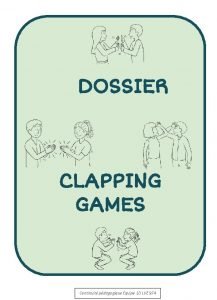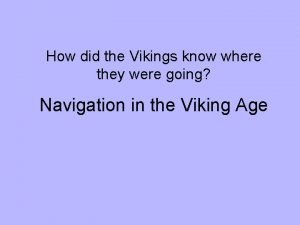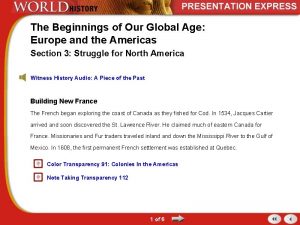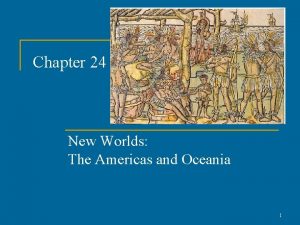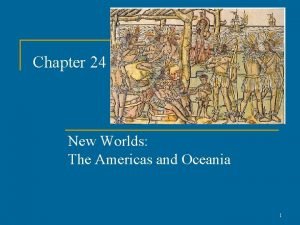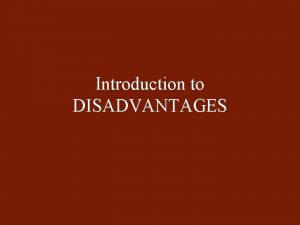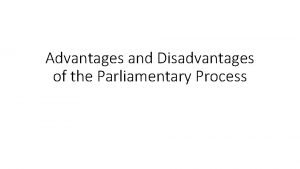WHAT WERE AMERICAS ADVANTAGES AND DISADVANTAGES GOING INTO












- Slides: 12

WHAT WERE AMERICA’S ADVANTAGES AND DISADVANTAGES GOING INTO THE WAR? Warm Up: You are going to a fight, the 6’ 5” muscle bound heavy-weight champion of the world is fighting against an unknown who has never been in a fight and looks like he hasn’t eaten in a month. Who is your money on and why?

Advantages • Leadership • George Washington: Seasoned war leader • Benjamin Franklin: Skilled diplomat, loved by the French • Fighting a defensive war on their own grounds • Self sufficient, didn’t have to import good to survive • Saw themselves as fighting a just cause with a historical purpose

Disadvantages • Poorly organized army • Lack of unity between colonies • Lack of money and hard cash; had to print worthless paper • • • money Lack of military supplies, most firearms for hunting Army lacked food at points No navy Unreliable soldiers who received lousy training and less pay. Fighting against the biggest, most experienced and well equipped empire in the world with the world’s largest navy and industrial capacity. Divided population, many loyalists were committed to the British cause

Attempt at Reconciliation • After the Battle of Bunker Hill (1775) Continental Congress adopts Olive Branch Petition pledging loyalty if the king would stop hostilities • King George III upset at tensions hired Hessian mercenaries to fight in the Americas, further enrages tensions • Most did not want to go to all out war

Thomas Paine and Common Sense • Thomas Paine was an early patriot who distributed 120, 000 copies of his pamphlet Common Sense in 1776 • It served as a wake up call for Americans that enraged passions and led to a call for independence from Britain • Championed a Republican form of government, leaning on political philosophies of Europe

Declaration of Independence • The Continental Congress reacted to the rejection of the Olive Branch Petition and Common Sense by voting for independence on July 2, 1776 • Thomas Jefferson was commissioned to write the formal Declaration of Independence approved July 4, 1776 which was a letter to King George III declaring independence from England • Jefferson borrowed from ideas of the Enlightenment, notably, John Locke’s ideas of the Social Contract and Natural Human Rights

Loyalists vs. Patriots • 16% or so of the population remained loyal to the king, centered around New York • Many were made officers in the British army • Hated by the patriots, many had their property seized during the Revolution

Burgoyne’s Invasion • The British planned a three -pronged invasion of the colonies in 1777 to divide the colonies in half • Burgoyne and St. Ledger were to invade from Canada, How from New York City • Howe instead decided to go for glory attacking Philadelphia • St. Ledger stopped at Ft. Stanwix, Burgoyne as the Battle of Saratoga

Enter the French • After Saratoga, the French decided to enter into the war after negotiations with ambassador Benjamin Franklin • Signed a treaty in February 1778 and the French entered into the war providing Americans with expertise, training, men, ships and opening a wider war in Europe

Treaty of Ft. Stanwix • The Iroquois split over the American Revolution with two tribes staying loyal to Americans and the others siding with the British • Americans beat back the warring tribes and signed treaty in 1779 taking most of the Iroquois land in New York pushing most west

Treaty of Paris • France wanted to humble Britain and wanted an independent though not powerful United States • US made separate peace with Britain on favorable terms in 1883 • US recognized • Granted all lands from Mississippi in West, Great Lakes in North, Florida to the South • Granted that loyalist property would be returned and debts paid

Task: Read pp. 142 -143 • Take a position to affirm or refute the Olive Branch Petition • Write a sentence demonstrating one piece of evidence from the historical period that affirms their position • Write a sentence demonstrating one piece of evidence from the historical period that refutes their position • Explain why their position makes more sense.
 Tic tac toe going high going low going criss cross lollipop
Tic tac toe going high going low going criss cross lollipop Future in the past was were going to examples
Future in the past was were going to examples Going through hell
Going through hell How did the vikings know where they were going
How did the vikings know where they were going Bear hunt song dr jean
Bear hunt song dr jean Were going tense
Were going tense The beginning of our global age europe and the americas
The beginning of our global age europe and the americas Chapter 24 the americas and oceania
Chapter 24 the americas and oceania New worlds the americas and oceania
New worlds the americas and oceania New worlds the americas and oceania
New worlds the americas and oceania Ap world history chapter 20 the americas and oceania
Ap world history chapter 20 the americas and oceania The beginnings of our global age europe and the americas
The beginnings of our global age europe and the americas State building in the americas
State building in the americas
